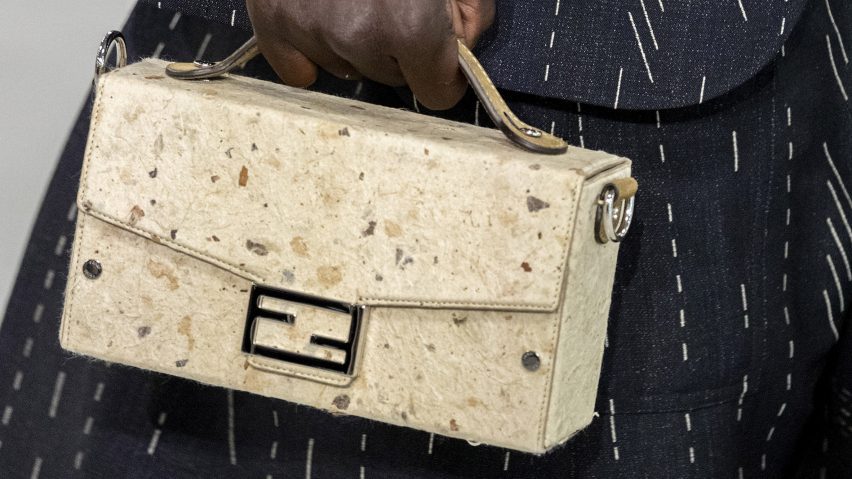Italian fashion house Fendi has collaborated with Japanese architect Kengo Kuma to design accessories that reference ancient Japanese craft techniques, which were presented at Fendi's latest menswear show.
The accessories were showcased during Fendi's Spring Summer 2024 menswear show, which took place in June at the Piuarch-designed Fendi Factory during Pitti Uomo – a prestigious biannual menswear fair in Florence.
For the collaboration, Fendi's Peekaboo bag, Baguette Soft Trunk and Flow Sneakers were reinterpreted by Kuma using natural materials and ancient Japanese craft techniques.
A number of the bags were constructed using waranshi, a hybrid of washi paper made from cotton and tree bark fibres that is traditionally used across origami, lantern-making and kimono detailing.
The waranshi is used as a soft textural fabric and forms the structural base of the bag. Its speckled, imperfect surface, which has visual similarities to handmade paper, is used as the ornamentation across the exterior of the bags.
The imperfect waranshi was used across the exterior of the Peekaboo bag, Baguette Soft Trunk and Flow trainers.
A second bag was constructed from pale birch bark, which the brand explained nodded to Fendi's Pequin-stripe pattern. The raw bark was used across the exterior of the bag and has an internal frame and hardware details constructed from Tuscan olivewood.
"I've always thought of Kengo Kuma as a master of naturalist architecture, he was one of the first to understand the importance of building nature into architecture both inside and outside," said Fendi artistic director of accessories and menswear, Silvia Venturini Fendi.
"His work mixes the future with his roots in a very essential way. I feel a sense of kinship with his Japanese approach to savoir-faire – I think it is such a strong shared value between Japan and Italy," Fendi continued.
"Our partnership with Kengo Kuma creates not only a dialogue between Fendi and architecture but a conversation with another designer and their choice of artisans and materials."
The internal structure of Fendi's Peekaboo bag was constructed using methods referencing yatara ami weaving, a technique that uses fine bamboo pieces to create woven lattice forms.
This traditional weaving technique was also used to inform the shape of the sole on the Flow trainers, in which Kuma created two styles for the show that consisted of a recycled poly-cotton knit upper and a waranshi upper.
The architect also reimagined the Flow trainer completely, introducing a laced and zipped upper that was paired with a cork insole and a moulded sole in an undyed, biobased ethyl vinyl acetate (EVA).
"It is important that Fendi's artistic projects continue to grow outside of Italy, as we recognise that creativity at scale is never the work of one person: it's a cooperation between hands and minds and different talents and resources from around the world," said Silvia Venturini Fendi.
"Nature and craft have always been at the centre of my work as an architect and a designer," said Kengo Kuma. "When Fendi asked me to reflect on their bags and shoes, I thought of them like small architectural projects on a human scale."
"I have transformed some of Silvia Venturini Fendi's signature men's designs with traditional Japanese techniques and materials, showing our shared passion for nature, lightness, and innovative design."
For Fendi's Autumn Winter 2023 menswear show, the brand collaborated with Italian artist Nico Vascellari who transformed its headquarters into a "roller disco pinball machine" runway.
More recently at Paris Fashion Week, Villa Eugénie created a "mechanical garden" for Dior's Spring Summer 2024 menswear show.
The photography is courtesy of Fendi.

